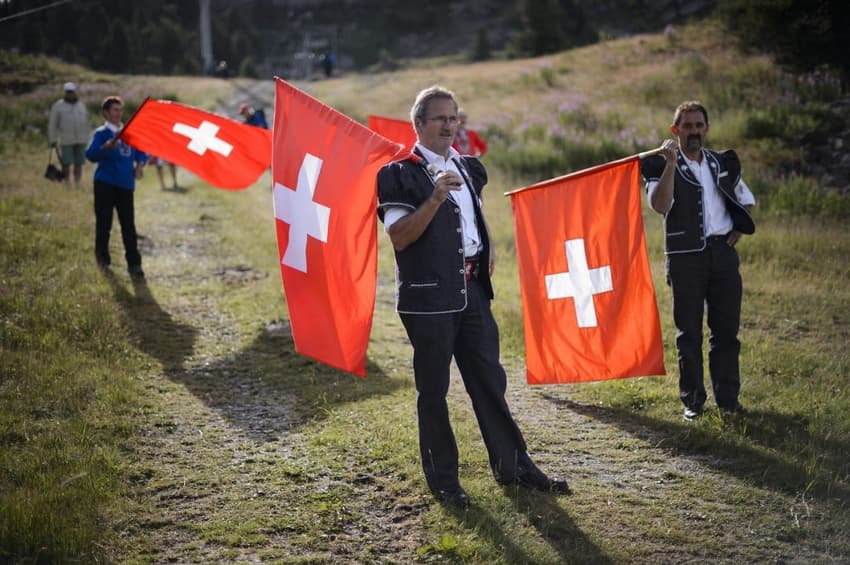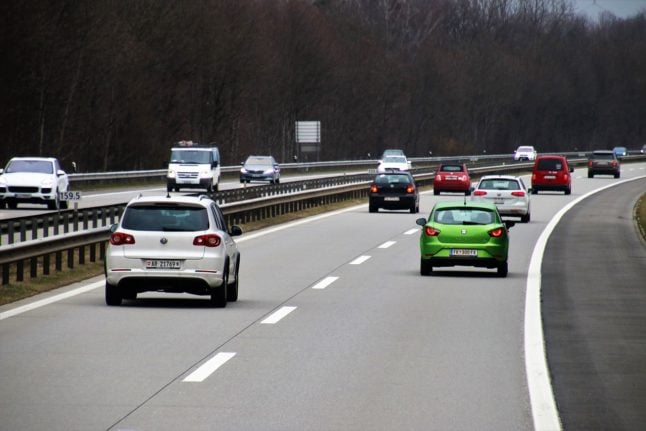Why a Frenchman with Swiss heritage was turned down for citizenship

Even though a Swiss passport can be obtained through descent, this family tie didn’t make one French citizen and his children eligible for facilitated naturalisation. Here's why.
The facilitated process, also called ‘simplified’ or ‘fast-track’, is reserved for certain foreigners.
This category includes third-generation foreign nationals whose grandparents were Swiss, spouses of Swiss citizens, as well as children of Swiss parents.
So why was the Frenchman denied this right?
Despite its name, this kind of naturalisation procedure is neither simple nor fast (nothing in Switzerland is). It requires a certain burden of proof, along with other conditions to be met.
This article explains all the details:
Five ways you can fast-track your route to Swiss citizenship
The 49-year-old man originally submitted his application to a Swiss consulate in his hometown of Lyon in 2017, motivating it by the fact that his great-grandmother was born Swiss and that his father had been naturalised through a fast-track process.
The State Secretariat for Migration (SEM) conducted its investigation and turned down his request, finding that the applicant didn’t have close enough ties with Switzerland, a major condition for facilitated naturalisation.
In fact, he hadn't even set foot on Swiss soil in the past 10 years — even though only 150 km separate Lyon from Geneva — and his knowledge of the country was deemed “only average", according to authorities.
The man challenged SEM’s decision by appealing to the country’s highest judicial authority, the Federal Court.
However, in its ruling handed down on Thursday, the Court sided with SEM, pointing out that the only condition the Frenchman filled is the knowledge of one of Switzerland’s national languages — French.
Not only was his appeal rejected, but the man also has to pay 2,000 francs in legal costs.
This doesn’t however, mean the end of the road for the unsuccessful candidate.
He can re-apply for citizenship, but the ‘ordinary’ rather than facilitated kind, where the bar for naturalisation is much higher.
At the very least, the rejected candidate may find comfort in a case of his fellow countryman, who has lived in Geneva for 40 years, but whose application for citizenship was turned down over a speeding ticket he received in 2017:
Frenchman barred from Swiss citizenship over speeding offence
 Speeding can stop you from getting citizenship. Photo: Pixabay
Speeding can stop you from getting citizenship. Photo: Pixabay
What does having ‘close ties’ with Switzerland mean, exactly?
The conditions are very specific and go far beyond mere blood ties.
According to the Federal Court, a person claiming close ties must prove “at least three stays in Switzerland of a minimum duration of five days during the six years preceding the application"; to be able to speak a national language on a daily basis; to have "elementary" knowledge of geography, history, and Swiss politicians; and to "maintain contacts with Swiss people".
The fact that the man failed on “elementary knowledge” of the country doesn’t bode well in terms of obtaining Swiss citizenship.
As tens of thousands of other candidates for naturalisation know, this kind of knowledge and interest in everything ‘Swiss’ shows good integration — or at least willingness to adapt to the local values and way of life.
In fact, integration — defined by SEM as participation “in the economic, social and cultural life of society” — is an essential condition for citizenship and a huge factor in granting, or denying, the Swiss passport.
Admittedly, how this requirement is interpreted in real life is left up to local naturalisation committees who have been known to make arbitrary judgements on quite a few occassions..
READ MORE: Why your Swiss citizenship application might be rejected - and how to avoid it
From jogging outfits to cheeses
Some of the examples of these subjective decisions include a family from Kosovo, long-term residents in Switzerland, who have had their application for citizenship refused, due to their habit of wearing jogging bottoms in town and not greeting passersby.
Another case involved a British man whose application was denied because he couldn’t provide correct answers to questions about the origin of a Swiss dish, raclette.
All this proves that the criteria for obtaining a Swiss passport are very demanding, which may make the Frenchman feel a little bit better about not getting his.
READ MORE: The ten most surprising questions on Switzerland's citizenship exam
Comments
See Also
The facilitated process, also called ‘simplified’ or ‘fast-track’, is reserved for certain foreigners.
This category includes third-generation foreign nationals whose grandparents were Swiss, spouses of Swiss citizens, as well as children of Swiss parents.
So why was the Frenchman denied this right?
Despite its name, this kind of naturalisation procedure is neither simple nor fast (nothing in Switzerland is). It requires a certain burden of proof, along with other conditions to be met.
This article explains all the details:
Five ways you can fast-track your route to Swiss citizenship
The 49-year-old man originally submitted his application to a Swiss consulate in his hometown of Lyon in 2017, motivating it by the fact that his great-grandmother was born Swiss and that his father had been naturalised through a fast-track process.
The State Secretariat for Migration (SEM) conducted its investigation and turned down his request, finding that the applicant didn’t have close enough ties with Switzerland, a major condition for facilitated naturalisation.
In fact, he hadn't even set foot on Swiss soil in the past 10 years — even though only 150 km separate Lyon from Geneva — and his knowledge of the country was deemed “only average", according to authorities.
The man challenged SEM’s decision by appealing to the country’s highest judicial authority, the Federal Court.
However, in its ruling handed down on Thursday, the Court sided with SEM, pointing out that the only condition the Frenchman filled is the knowledge of one of Switzerland’s national languages — French.
Not only was his appeal rejected, but the man also has to pay 2,000 francs in legal costs.
This doesn’t however, mean the end of the road for the unsuccessful candidate.
He can re-apply for citizenship, but the ‘ordinary’ rather than facilitated kind, where the bar for naturalisation is much higher.
At the very least, the rejected candidate may find comfort in a case of his fellow countryman, who has lived in Geneva for 40 years, but whose application for citizenship was turned down over a speeding ticket he received in 2017:
Frenchman barred from Swiss citizenship over speeding offence

What does having ‘close ties’ with Switzerland mean, exactly?
The conditions are very specific and go far beyond mere blood ties.
According to the Federal Court, a person claiming close ties must prove “at least three stays in Switzerland of a minimum duration of five days during the six years preceding the application"; to be able to speak a national language on a daily basis; to have "elementary" knowledge of geography, history, and Swiss politicians; and to "maintain contacts with Swiss people".
The fact that the man failed on “elementary knowledge” of the country doesn’t bode well in terms of obtaining Swiss citizenship.
As tens of thousands of other candidates for naturalisation know, this kind of knowledge and interest in everything ‘Swiss’ shows good integration — or at least willingness to adapt to the local values and way of life.
In fact, integration — defined by SEM as participation “in the economic, social and cultural life of society” — is an essential condition for citizenship and a huge factor in granting, or denying, the Swiss passport.
Admittedly, how this requirement is interpreted in real life is left up to local naturalisation committees who have been known to make arbitrary judgements on quite a few occassions..
READ MORE: Why your Swiss citizenship application might be rejected - and how to avoid it
From jogging outfits to cheeses
Some of the examples of these subjective decisions include a family from Kosovo, long-term residents in Switzerland, who have had their application for citizenship refused, due to their habit of wearing jogging bottoms in town and not greeting passersby.
Another case involved a British man whose application was denied because he couldn’t provide correct answers to questions about the origin of a Swiss dish, raclette.
All this proves that the criteria for obtaining a Swiss passport are very demanding, which may make the Frenchman feel a little bit better about not getting his.
READ MORE: The ten most surprising questions on Switzerland's citizenship exam
Join the conversation in our comments section below. Share your own views and experience and if you have a question or suggestion for our journalists then email us at [email protected].
Please keep comments civil, constructive and on topic – and make sure to read our terms of use before getting involved.
Please log in here to leave a comment.